Member Spotlight - Kathy Demsky
Kathy Demsky is the director of the Architecture Resource Center (ARC) at James White Library of Andrews University where she has been employed since 1987. In addition Kathy has spent the last 27 years working with the Environmental Design Research Association (EDRA) providing publication displays, thus creating a symbiotic relationship between EDRA and the ARC. She is known to her faculty and students as the renegade librarian because she doesn't follow the stereotypical norms in a library.
Kathy Demsky
Director of Architecture Resource Center at James White Library
Andrews University
Three words to describe yourself
I am dedicated, passionate and proactive in my work.
What is your passion?
The students, the faculty, the Waldensian class that I teach, along with the EDRA organization I work with. It has been very rewarding building the collection and administrating the Architecture Resource Center (ARC). The rewards come from serving the students and faculty on campus as well as the community. In the ARC I provide teas and hot chocolate along with other snacks. There are couches and blankets so students can take a break from their long hours in studio for a quick nap. So you can study, sleep, eat and talk in this library. I am known as the renegade librarian because we don’t follow the stereotypical norms in a library.
I began to teach the Waldensian history class in 1997. We helped to set up a study-abroad program for the school of architecture in Europe; since the Waldensian history took place in the Piedmont region of Italy, we decided to include it in the program. It is a comparison study of sorts between the renaissance of Europe and the simple life style of an ancient people who inhabited this area for over a thousand years. “The purpose of this class was to bring the students not only the historical and spiritual perspective but also a personal experience of faith. The students were challenged to assess their own faith and courage throughout life”.
The Environmental Design Research Association (EDRA) is an international, interdisciplinary organization which was founded in 1968 by architects, design professionals, educators, environmental managers/psychologists, behavioral and human/social scientists and urban planners. The purpose of EDRA is to advance the art and science of environmental design research, to improve understanding of the interrelationships between people and their built environment along with the natural surroundings, and to help create environments responsive to human needs. For twenty-seven years, I have worked with this organization in providing publication displays, thus creating a symbiotic relationship between EDRA and the Architecture Resource Center (ARC).
How long have you been working in the library field?
In 1987, I was invited by the director of the ARC to become his assistant. Within three years I became the director and have held this position for 27 years.
Is this arch library one of the largest in Michigan?
The ARC is recognized internationally due to its work with the EDRA organization. It has the largest collection in the world on the human factor as it relates to design. We also receive high marks from the National Architecture Accrediting Board (NAAB) during their visits.
What do you most like about working in the library?
I enjoy interacting with the students and faculty, and providing cutting-edge materials in the ARC for their use.
Why did you join MLA?
I just joined the membership this year, but I have attended their previous conferences. I was so impressed with the camaraderie of the group; it was very welcoming. I appreciated all the presentations which were very helpful, but I resonated most with the “Anythink Libraries” Luncheon because that’s the type of library we have created.
What is your favorite book and why?
I enjoy reading historical novels. I am also interested in human factor as it relates to design because light, space, and color affect all of us more than we realize.
Pose a question to the library community that address future trend.
In the academic library world, there have been discussions about new technology doing away with books and libraries. I don't believe this is true because the essence of the library is to help people find information and to assist the community. Technology is important, and it will open up more doors in the future. Even now we help people from our communities while giving access internationally as well, something that was impossible before technology. I think that in the future, we will continue to refine technology, benefitting the library and its databases while always remembering that people, our patrons, are the most important users in our libraries.
Interviewed by MLA Membership & Communications Committee member Xiaoming Xu, Andrews University; edits provided by Kathy Demsky.
|











